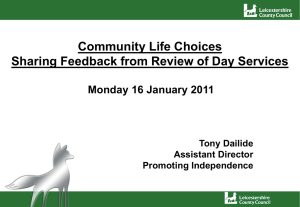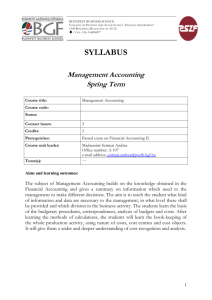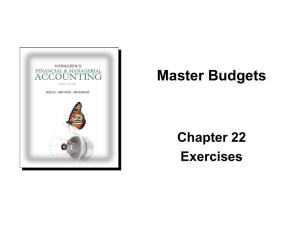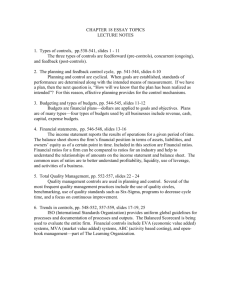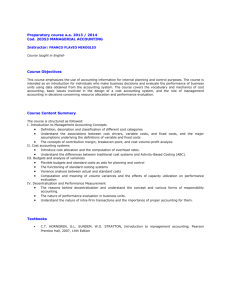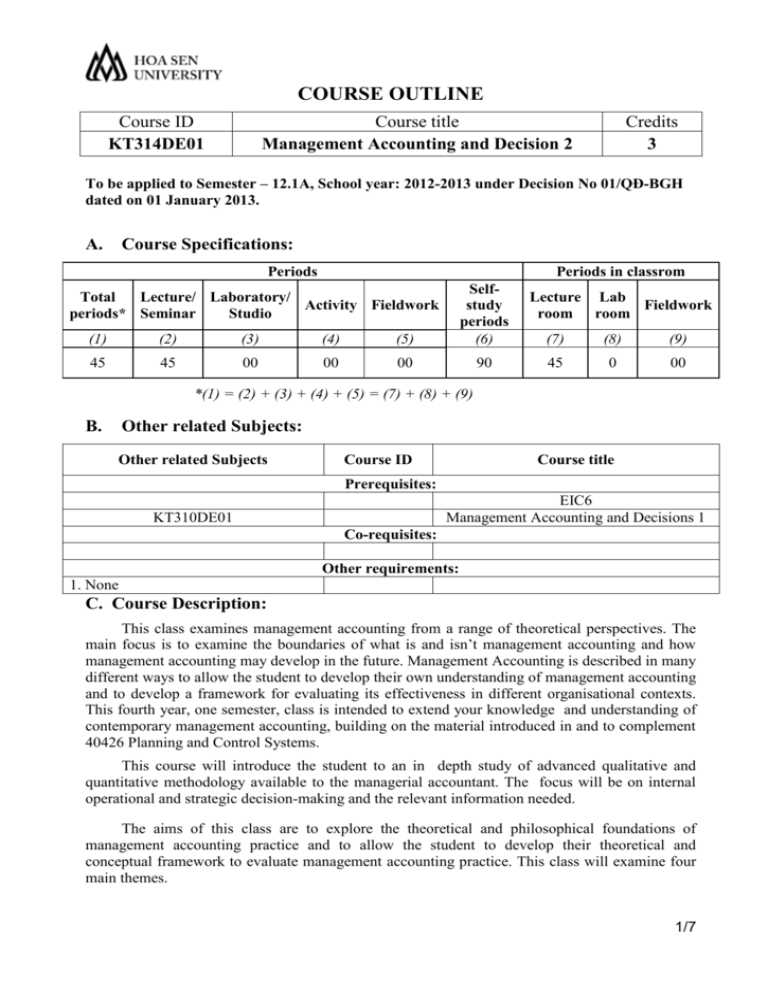
COURSE OUTLINE
Course ID
KT314DE01
Course title
Management Accounting and Decision 2
Credits
3
To be applied to Semester – 12.1A, School year: 2012-2013 under Decision No 01/QĐ-BGH
dated on 01 January 2013.
A.
Course Specifications:
Periods
Periods in classrom
(1)
(2)
(3)
(4)
(5)
Selfstudy
periods
(6)
45
45
00
00
00
90
Total
Lecture/ Laboratory/
Activity Fieldwork
periods* Seminar
Studio
Lecture Lab
Fieldwork
room room
(7)
(8)
(9)
45
0
00
*(1) = (2) + (3) + (4) + (5) = (7) + (8) + (9)
B.
Other related Subjects:
Other related Subjects
Course ID
Course title
Prerequisites:
EIC6
Management Accounting and Decisions 1
KT310DE01
Co-requisites:
Other requirements:
1. None
C. Course Description:
This class examines management accounting from a range of theoretical perspectives. The
main focus is to examine the boundaries of what is and isn’t management accounting and how
management accounting may develop in the future. Management Accounting is described in many
different ways to allow the student to develop their own understanding of management accounting
and to develop a framework for evaluating its effectiveness in different organisational contexts.
This fourth year, one semester, class is intended to extend your knowledge and understanding of
contemporary management accounting, building on the material introduced in and to complement
40426 Planning and Control Systems.
This course will introduce the student to an in depth study of advanced qualitative and
quantitative methodology available to the managerial accountant. The focus will be on internal
operational and strategic decision-making and the relevant information needed.
The aims of this class are to explore the theoretical and philosophical foundations of
management accounting practice and to allow the student to develop their theoretical and
conceptual framework to evaluate management accounting practice. This class will examine four
main themes.
1/7
• What is management accounting? Where are its origins, its theoretical framework, its historical
development?
• What do management accountants do?
• How important is the operational context when evaluating management accounting practice?
• Are there any new 'solutions' or developments that claim to improve 'management accounting'?
The class achieves these aims through the student reading and developing an understanding of a
set of academic articles and student-led seminar discussions and presentations.
D. Course Objectives:
No.
Course Objectives
1.
Identify, understand, and discuss the nature, purpose, and importance of different
types of decision-relevant managerial accounting information;
2.
Identify, understand, and apply fundamental quantitative techniques used to
generate decision-relevant managerial accounting information;
3.
Make sound strategic and operational business decisions based on your
development and evaluation of supporting management accounting information;
and
4.
Identify some seminal theories that explain why we observe certain cost
management and performance measurement techniques in practice.
5.
Apply advanced managerial accounting concepts in order to make more informed
and more effective decisions in simulated and actual business situations.
6.
Demonstrate critical thinking through effective writing skills in describing,
analyzing and evaluating ideas and experiences.
7.
Prepare professional management reports using proper citation standards, that
require judgement and analytical skills based on quantitative and qualitative
information resulting from research.
8.
Develop, prepare and deliver effective oral presentations clearly demonstrating a
mastery of the case strategy, performance results and optimal recommendations.
9.
Assess, interpret and evaluate different issues that may be faced by business
organizations and learn how to effectively document an analysis and provide a
preliminary recommendation.
10.
Develop management accounting information systems that will play an important
role in the overall success of an organization.
2/7
E. Learning Outcomes:
No.
Learning Outcomes
1.
Develop intellectual and professional competencies by analysing and evaluating
evidence, logical reasoning and practical applications.
2.
Develop communication skills – explaining, listening, discussion, questioning,
presenting and defending a position, giving feedback, writing
3.
Develop group management skills.
4.
Develop intellectual understandings, clarifying concepts and theories by thinking,
discussion, doing, observing and constructing connections.
5.
Develop a mature learning stance by accepting personal responsibility for
progress and direction of learning, questioning authority, using feedback from
mistakes
6.
Explain cost management concepts, product costing techniques, and planning &
control systems;
7.
Use relevant information for making decisions and Prepare a master budget and a
flexible budget, compare the budgets with actual results, analyze and interpret
variances;
8.
Apply Management Accountants’ Codes of Ethics to resolve an ethical situation;
Develop verbal and writing communication skills and teamwork ability.
F. Instructional Modes:
– This course was conducted in the class as lecture.
– Teaching in the class: 30 hours (3 hours per day) and learning in class room by face-toface discussion.
– Hour for doing exercises: 15 hours (1 hour per day) and learning in class room.
– Students will be divided into some small groups to exchange, discuss, handle the situation,
do homework and declare taxes.
– Translation some exercise from Vietnam to English and solving them. This work is helped
the students knowing the academic terms in Auditing and Accounting.
– Do the seminar: comparison between Vietnamese auditing standards and system of foreign
countries in the world.
G. Textbooks and teaching aids:
Required Textbooks and Materials:
3/7
– Cost Accounting, Prentice Hall, 5th Canadian edition, Horngren, Foster, Datar, Teall, and
Gowing (ISBN 0-13-197190-5).
– Cost accounting, FAA UEH in Ho Chi Minh City, Vietnam
Suggested Course Materials:
– May, C.B. & May, G.S.. Effective Writing: A Handbook for Accountants. 9th edition.
Pearson Prentice-Hall , 2012. Type: Textbook, ISBN: 978-0-13-256724-4
– Horngren, Foster, Data & Gowing. Cost Accounting: A Managerial Emphasis. 5th Cdn
edition. Pearson, 2010. Type: Textbook, ISBN: 978-0-13-508407-6
– Horngren, Foster, Data & Gowing. Student solutions Manual for Cost Accounting: A
Managerial Emphasis. 5th Cdn edition. Pearson, 2010. Type: Textbook, ISBN: 978-0-13611021-7
– Managerial Accounting; Garrison, Noreen & Brewer, 13th. Ed. (ISBN 10: 0390447501 or
ISBN 13: 9780390447500)
– American Accounting Association. (2010). American Accounting Association/Financial
Accounting Standards Board: AAA/FASB. Available at http://aaahq.org/acdLogin.cfm
– The American Institute of Certified Public Accountants. (2012). AICPA: American
Institute of CPAs. Available at http://www.aicpa.org/
Teaching aids:
– Projector and Micro
– Blackboard, chalk or pen for writing onto the board
– Internet Access: you will need convenient access to the Internet. While not all assignments
will be on-line, there will be submission requirements requiring connection. Investigate as
soon as possible getting connected or plan on using university resources.
H. Assessment Methods (Requirements for Completion of the Course):
1. Description of learning outcomes assessment
This is an advanced course in strategic management accounting which examines
the integrative and interdisciplinary role of management accounting, and its contribution
to strategic management processes. The course uses a case-based and business
simulation approach. The course focuses on building competencies, including the
application of management accounting tools and techniques, and the effective
evaluation, assessment and interpretation of information. These competencies should
improve decision making, performance evaluation and strategic processes leading to the
overall success of a business organization.
Learning in this course results primarily from in-class discussion and participation
of comprehensive assurances cases as well as out-of-class analysis. The balance of the
learning results from the lectures on strategic concepts, from related readings, and from
researching your presentations, cases, assignments, simulation decisions and projects.
All work will be evaluated on an individual basis except in certain cases where group
work is expected. In these cases group members will share the same grade adjusted by
peer evaluation (where appropriate).
The classroom format will be interactive and I will assume that you have read and
prepared all of the assigned discussion questions, though we may not have time to cover
every one. Case studies for class discussion will also be handed out or made available on
WebCT ahead of the class when they will be discussed. Examination materials are drawn
from readings, cases, class presentations, and in-class and written assignments.
4/7
2. Summary of learning outcomes assessment
* For main semester:
Components Duration
Mini-Test 1
Hour
Mid-term
Test
Mini-Test 2
60 mins
Final Test
90 mins
-
Assessment Forms
Individual or group
exercises
Multiple choices or/and
Problem
-
Percentage
20%
-
-
Multiple choices and
Problem
50%
Based on Education
Department’s schedule
Total
Schedule
Every week
Week 8
30%
100%
3. Academic Integrity
Academic integrity is a fundamental value that affects the quality of teaching, learning,
and research at a university. To ensure the maintenance of academic integrity at Hoa Sen
University, students are required to:
Work independently on individual assignments
Collaborating on individual assignments is considered cheating.
Avoid plagiarism
Plagiarism is an act of fraud that involves the use of ideas or words of another
person without proper attribution. Students will be accused of plagiarism if they:
i. Copy in their work one or more sentences from another person without proper
citation.
ii. Rephrase, paraphrase, or translate another person’s ideas or words without
proper attribution.
iii. Reuse their own assignments, in whole or in part, and submit them for another
class.
Work responsibly within a working group
In cooperative group assignments, all students are required to stay on task and
contribute equally to the projects. Group reports should clearly state the
contribution of each group member.
Any acts of academic dishonesty will result in a grade of zero for the task at hand and/or
immediate failure of the course, depending on the seriousness of the fraud. Please consult
Hoa Sen University’s Policy on Plagiarism at http://thuvien.hoasen.edu.vn/chinh-sachphong-tranh-dao-van. To ensure the maintenance of academic integrity, the university asks
that students report cases of academic dishonesty to the teacher and/or the Dean. The names
of those students will be kept anonymous.
I. Teaching Staff:
No.
Professor’s name
1
Pham Quang Huy
Email, Phone number,
Office location
pqh.huy@gmail.com
Office hours
-
Position
Visiting
5/7
2
-
lecturer
Guest
speaker
3
4
J. Outline of Topics to be covered (Learning Schedule):
Main semester: Once per week
Subordinate semester: Twice per week
Week/ Meeting
Topics
References
Homework
/Assignment
1.
Management accounting and responsibility
management
- Application of financial information in
responsibility management
- Types of responsibility centers and the ways
of their management
2.
Management accounting and responsibility
management (cont)
- Costs, transfer prices and their reflection in
responsibility centres revenues, types of
responsibility centres results
- Cash flow and its application in responsibility
management
3.
Flexible Budgets, Direct-Cost Variances, and
Management Control
4.
Flexible Budgets, Direct-Cost Variances, and
Management Control (cont)
5.
Systems Design: Job Order Costing
6.
Systems Design: Process Costing
7.
Cost Behavior Analysis and Use
8.
Review and Mid term test in class+ continue
teaching
9.
Profit Planning
10.
Flexible Budgets and Performance Analysis
11.
Flexible Budgets and Performance Analysis
6/7
Week/ Meeting
Topics
References
Homework
/Assignment
(cont)
12.
System of plans and budgets and its realtion
to management accounting
- Relation of plans and budgets to company
policies
- Long term and short term company budgets
- Master Budgets and its relation to partial
company plans and budgets
- Company budgets transformation to lower
intra-company budgets
- Budgets verification
13.
Calculation the cost of finished goods – Case 1
14.
Calculation the cost of finished goods – Case 2
15.
General Review – Revision – Q&A
Notice:
Subject is designed with the participant of guest speaker who will share reality from
experience or students will be attended the seminar during the subjects
7/7

